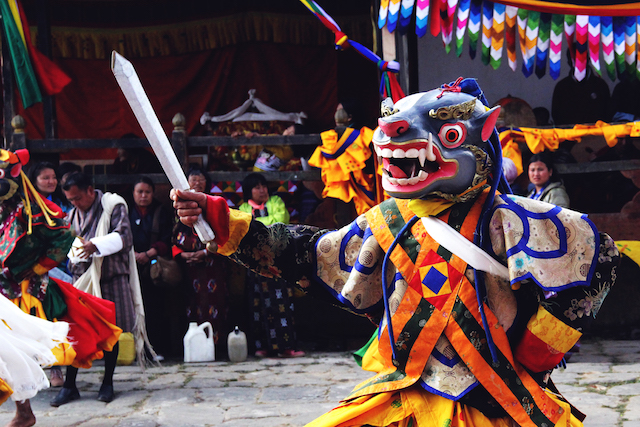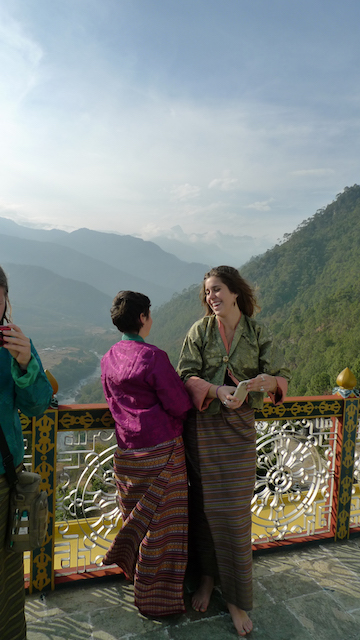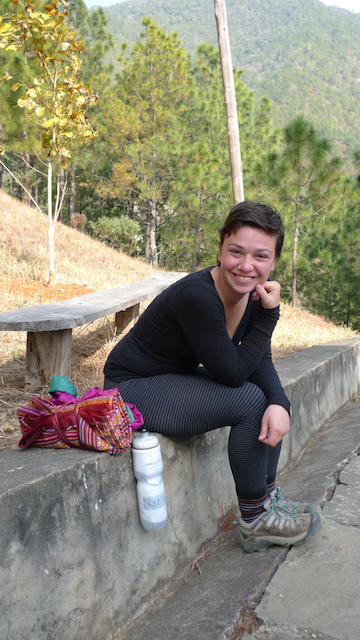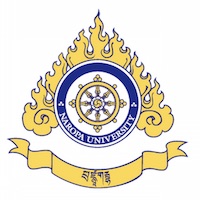
This post comes from Naropa University, an elephant partner. The elephant team is honored to share their work. May it be of benefit! ~ Ed.
Lacey Ranf was participant in Naropa University’s Bhutan Study Abroad Program. In this student travel program, open to all students currently enrolled at any U.S. university, you will spend a semester at RUB, in a Bhutanese culture immersion, experiencing the arts, spirituality, sustainable practices, mythology, education, happiness, and extraordinary landscapes similar to those in Nepal and Tibet.
Bittersweet has never been a more fitting way to describe how I feel.
As I scroll through my Facebook feed and see Naropa students with my Bhutanese friends, my heart aches a little bit.
I am surprised by how jealous I feel that new study abroad students are visiting the country I came to love. I deeply enjoy my life in Boulder and feel extremely grateful for my friends and community, but part of me yearns to go back to Bhutan.
To spend five months away from the hustle and bustle of life in the United States was a gift. At first, though, it was a hard gift to receive.
I cannot quite explain why it is so hard to do less, but those who have tried to meditate for a long time might know what I mean. Sure, we had our academics and everyday activities like cooking and laundry. Overall, though, we spent a great deal of our time doing “nothing.”
By American standards, we were wasting time.
By Bhutanese standards, we were drinking tea and going for walks. We were just living. With all the development and technology created to make life easier in the United States, we sure spend a lot of time trying to keep up with everything.
The culture of time and how it is spent in Bhutan is pretty much the opposite of that in the United States. I’m not sure two countries could contrast more. They actually have a phrase in Bhutan to describe their time. “BST,” they call it. Bhutanese Standard Time. We came to translate it as “hurry up and wait.”
I did not realize how much we valued timeliness in the United States until I went to Bhutan.
Now that I have been back in the U.S., it’s so clear to me. If we have class at 8:00, we cannot be late. If we have work at 1:00, we cannot be late. This makes sense, right?
But what if I am on the phone with my mother, and she’s worried about my sister? I will end the conversation to be on time to something else. I have just prioritized timeliness over my family. A lot of people prioritize time over basic necessities, such as eating and sleeping. I’m not saying that in Bhutan there were no deadlines or that people did not have expectations for timeliness, because they did. They didn’t, however, let it rule their lives.
Sure, we had to turn in papers on time, but the professor might be late because he was having tea with the school director. Our friends might be hours late for a picnic because they decided to cook a special Bhutanese dish. What I learned was that, culturally, American and Bhutanese priorities differed drastically around time, and those differences have an impact on all parts of our lives.
Another extreme contrast between American and Bhutanese culture was community.
In America, we are taught to be self-reliant and encouraged to be extremely independent. In my experience, collaboration is only appropriate in rare situations. We should be able to do everything on our own and if we ask for help, it shows our incompetence. If we ask for an answer on a test, we are cheating. If we are scared to be alone, we are weak. If we want to live in a big community and grow our own food in the woods, we are hippies.

In Bhutan, students do every assignment together, except the final exam. Whether it’s a paper or a presentation, they share answers they’ve found and send each other sources. They sit in a circle on the floor with tea in the middle and gossip in between assignments. If there is a celebration, they all get ready together, fixing each other’s Kiras and Ghos (Bhutanese traditional wear). If there is a soccer game on campus, all the students go.
And they welcomed us in.
They invited us to have tea with them right away. They made us dinners. They helped us with assignments. They took us on a trip into the mountains to soak in the hot springs. They taught us how to cook Bhutanese dishes. They welcomed us into their lives in a way that doesn’t happen very often in the United States.
They didn’t have much to offer, but they always offered something.
The Bhutanese seemed to do everything together in their collectivist culture. It always surprised them to see one of us U.S. students walking to town by ourselves or sitting in the kitchen alone. They worried that we were lonely and asked us frequently if we were.
The community there felt like a web. If someone was struggling, another individual in the community picked up the slack.
This can and does happen in the United States, but in my experience, it’s not nearly as interconnected as the community I saw in Bhutan. One of the biggest things I am still trying to integrate into my life from this experience is asking for help, and making sure that I am getting the support I need.
Although it is impossible to impose one culture’s norms onto another culture, I learned a lot about how independence could be hurting us as a culture in the United States, as the examples I saw in Bhutan might make life easier and more enjoyable, simply by creating more community.
The Bhutanese also have a simple, gentle sense of humor. They often referred to their bellies as a representation of Gross National Happiness: the bigger the belly, the happier the person.
For those who don’t know, Gross National Happiness (GNH) is equivalent (kind of) to Gross Domestic Product (GDP). Bhutan decided to measure its success based on the happiness of its people, rather than economics.
Maybe it was naive of me to imagine GNH as a solution to all of our problems here in the U.S., but I was hoping that it would offer me some insight into a better way of living, and on a macro level, a better way to run our country. Maybe we could do a simple copy and paste of the ideals of Bhutan and everything would be better.
What I learned, however, is that GNH was only a small contribution to the happiness of the individuals. GNH, as I saw it, was more of a representation of what they hope to achieve, how they aspire to live. In practice, GNH has flaws, just like any government agency.
In Bhutan, the people did seem happier, more content, and my definition of happiness actually changed while I was there.

My previous definition of happiness was big smiles, laughter, and no problems. I thought of happiness as the highest of my highs, with the ultimate goal of being that happy all the time. That’s impossible, I know.
But in Bhutan, there was less pressure, stress, and expectation and this resulted in a more content way of being. It was not a state of the highest of the highs and no problems, but the lows seemed to be less frequent and less of a low.
Much of what I learned while in Bhutan could be lumped into the category of every study abroad experience of trying exciting new food and meeting new people. Bhutan, however, has this indescribable magic.
I learned what it means to be away from everything I identify with; from my family and friends to my own self. It was incredibly painful to be so far away from everything I love for so long, but it created an immense sense of gratitude that has not gone away.
I made friends in Bhutan, and a little family formed—something I was not expecting. Before I knew it, I was back in the U.S. and my friends in Bhutan were the friends and family I was missing.
I was hoping to find answers when I went to Bhutan, but instead I came home with a million more questions. What are my priorities? Why am I in such a hurry? Is this worth getting stressed out about? What would my Bhutanese friends say? How is culture playing a part in any given situation? Am I taking enough tea breaks?
Bhutan gave me the gift of new questions to guide my life, and the knowledge that all over the world, people are living in different ways.
Author: Lacey Ranf
Editor: Emily Bartran
Photos: Author’s Own






Read 1 comment and reply